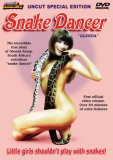| Reviews & Columns |
|
Reviews DVD TV on DVD Blu-ray 4K UHD International DVDs In Theaters Reviews by Studio Video Games Features Collector Series DVDs Easter Egg Database Interviews DVD Talk Radio Feature Articles Columns Anime Talk DVD Savant Horror DVDs The M.O.D. Squad Art House HD Talk Silent DVD
|
DVD Talk Forum |
|
|
| Resources |
|
DVD Price Search Customer Service #'s RCE Info Links |
|
Columns
|
|
|
Snake Dancer
Bearing the onscreen title Glenda, the film purports to tell the life story of Glenda Kemp, a university graduate with a passion for exotic dance and a curious attraction to snakes. Kemp plays herself, more or less, though her character is here called "Glenda Williams," which makes little sense until the film's bizarre final scene. (More on this below.)
She's clearly a "good girl," raised by kind, understanding parents who adopted her, and engaged to Ken, her stuffed-shirt, prudish boyfriend. Nevertheless, when on a lark she visits a strip club with some friends, Glenda impulsively jumps onstage and begins dancing, an act that she finds rewardingly expressive and liberating. Glenda's gyrations, rather like the crazed go-go dancer in all those Frankie & Annette Beach Party movies, proves to be a hit, and like Larry Parks in The Jolson Story Glenda's soon playing to bigger and classier houses.
Eventually her ne'er-do-well brother steals a boa constrictor from the Johannesburg Zoo for her as a gift, and she soon incorporates the pet into her act. Its phallic suggestiveness, with the slithering reptile gliding between Glenda's legs and she occasionally sticking its head in her mouth, creates a sensation, and soon Glenda is up on charges of indecency.
Though it sounds awfully incendiary, Glenda is actually pretty tame stuff, with the look and feel of a TV movie, and chock-full of nearly every show business biopic cliche in the book. The script is on Glenda's side - she just wants to dance, regarding it as legitimate performance art - but that's where all characterization ends. Mondo's DVD art implies something much more salacious when in fact the snake is just one small part of her act and only seen about 10% of the time that she's onstage. Mondo also implies a more political film about freedom of expression in a repressive society, a facet that just ain't there. Although South Africa was then in its darkest days of Apartheid, the uproar over Glenda's act wouldn't be much different if the story were set in Small Town, U.S.A.
Kemp is cute and likeable, but the film is just the story of an exotic dancer with a gimmick, and one leaves the film not knowing much more about Kemp's experiences than when one first came in. Major Spolier: Perhaps in trying to get the film approved for exhibition (though the director in an interview claims he added it himself, willingly), it has a Production Code imposed-like shock finish: Glenda is strangled to death by her own snake. Although the ending might have pleased South Africa's censorship board, it must have been an unsettling scene for the real Kemp to play out, to tell her own life story then to die horribly at the end. (Life, fortunately, didn't imitate art in this case. Kemp reportedly is happily working as a schoolteacher and no longer stripping.)
Video & Audio
Box text awkwardly and rather cryptically lists Glenda / Snake Dancer as a "new transfer from negative." It's also reported to be the "uncut export version" with a listed running time of 87 minutes. However, the DVD actually runs 82 minutes and isn't all that explicit. You could probably edit 30 seconds of choice footage and the film might well earn a PG or PG-13 rating today. The larger problem is that while the transfer might be new, and the source material may at one point have been a negative of one sort or another, what's onscreen is a flawed, extremely soft transfer with a lot of artifacting that at least looks like it was derived from a 20-year-old master. Reds and blacks don't read well at all (colors South African strip clubs seem to abound in), and the image breaks up into digital bricks with serious combing several times.
The last reel looks even worse, as no 35mm elements could be located, though truth be told it's not that much worse than the below par reels that preceded it. The presentation is full frame but that's obviously incorrect as well, based on the credit blocking and the framing of the actors (probably 1.66:1 or 1.85:1 is correct), though the film might conceivably been shown in some South African cinemas that way. The DVD is listed in 2.0 stereo but the film is mono with notably thin audio. It is all-region, however.
Extra Features
The primary supplement is Escape from Apartheid: A History of South African Cinema, which features film critic and historian Trevor Steele Taylor offering an interesting overview of that country's film industry. It and another extra, an interview with Glenda director Dirk DeVilliers, are in 16:9 enhanced format. The director interview is divided into three parts running a total of 17 minutes. Pete Toombs contributes the usual informative production notes.
Parting Thoughts
Snake Dancer is of minor interest, overall less than the featurette about South African cinema, though for her part Kemp is likeable and her story worth documenting, even in a third-rate exploitation picture.
Film historian Stuart Galbraith IV's most recent essays appear in Criterion's new three-disc Seven Samurai DVD and BCI Eclipse's The Quiet Duel.
|
| Popular Reviews |
| Sponsored Links |
|
|
| Sponsored Links |
|
|
| Release List | Reviews | Shop | Newsletter | Forum | DVD Giveaways | Blu-Ray | Advertise |
|
Copyright 2024 DVDTalk.com All Rights Reserved. Legal Info, Privacy Policy, Terms of Use,
Manage Preferences,
Your Privacy Choices | |||||||














